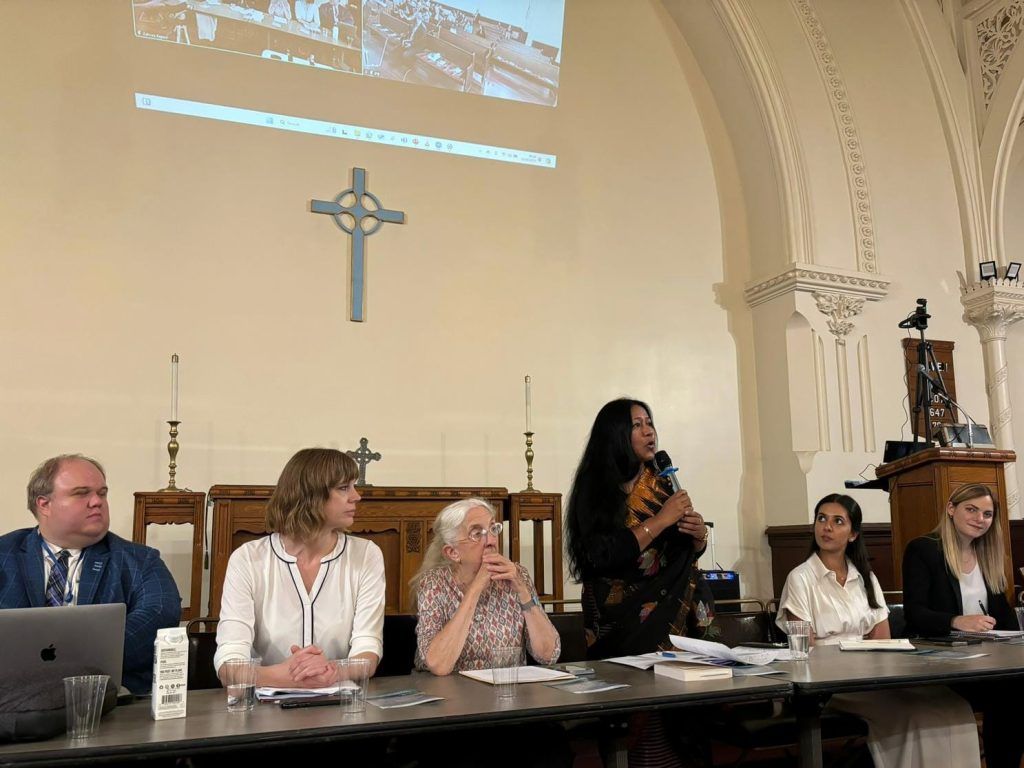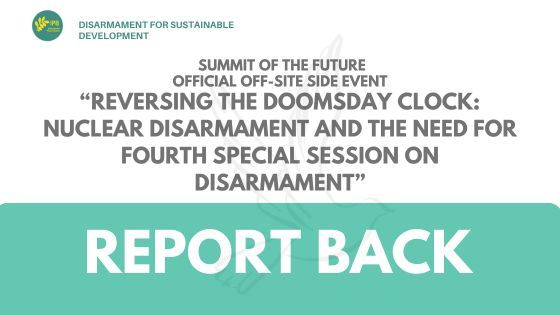The International Peace Bureau (IPB) participated in the Action Days and the Summit of the Future held in New York from September 20 to 23. During this pivotal event, we engaged in various activities and organized two significant events, one of which was an official offsite side event featured on the Action Days calendar.
Our official offsite side event “Reversing the Doomsday Clock: Nuclear Disarmament and the Need for a Fourth Special Session on Disarmament” aimed to advocate for a nuclear-weapon-free world and stronger disarmament commitments, calling for the convening of a Fourth Special Session on Disarmament (SSOD-IV). It took place in the beautiful and warmly welcoming Church of the Covenant on the afternoon of Saturday, September 21.
The event was co-sponsored by the Republic of Kiribati, International Peace Bureau (IPB), SCRAP Weapons (SOAS University of London), Nuclear Age Peace Foundation (NAPF), Parliament of the World’s Religions, Agora Mexico and was supported by many other partners like Reverse the Trend (RTT), Justice for All, Agora Mexico, Rosa Luxemburg Stiftung NY (RLSNY), the Episcopal Church, NGO Committee on Human Rights to the UN, NGO Committee on Disarmament, Peace, and Security, and Committee of Religious NGOs to the UN.
This gathering aimed to unite diverse stakeholders, including member states, civil society representatives, and experts in disarmament, to address the urgent need for a Fourth Special Session on Disarmament (SSOD-IV). As the UN Secretary-General stated, the Summit of the Future and its accompanying Pact for the Future offer a “once-in-a-generation opportunity” for member states and multistakeholders to come together and drive substantial global action.
Although using less strong language than in its previous revisions, the final Pact for the Future still outlines ambitions and commitments from member states on vital issues such as disarmament, climate change, and multilateral governance, offering a vision for transitioning from a tumultuous present to a more peaceful, equitable, and developed future. Importantly, its provisions on disarmament call for the activation of SSOD-IV, dedicating action clauses to addressing the illegality of nuclear weapons use and the necessity for improved non-proliferation and disarmament frameworks.
Our side event specifically focused on advancing the disarmament agenda as outlined by the Pact for the Future. We discussed how SSOD-IV could play a critical role in shaping a peaceful society and how both member states and civil society can contribute to this vision. The event emphasized the need to promote the human right to a safe and healthy environment by advocating for a nuclear-weapon-free world and stronger disarmament commitments for the benefit of both current and future generations.
We were fortunate to have excellent speakers who introduced key points in this vital discussion, paving the way for meaningful exchanges among participants.
Speakers included:
- Honorable Teburoro Tito, Kiribati Ambassador to the United Nations, the United States, and also the Kiribati Ambassador designate to Mexico and Canada.
- Dr. Kusumita P. Pedersen, Professor Emerita of Religious Studies at St. Francis College, Chair of the Interfaith Center of New York, member of the Climate Action Task Force (CATF) of the Parliament of the World’s Religions and of the Climate Working Group of the Committee of Religious NGOs at the United Nations.
- Christian N. Ciobanu, Policy and Advocacy Coordinator of the Nuclear Age Peace Foundation (NAPF) and the Project Coordinator for Reverse the Trend: Save Our People, Save Our Planet (RTT). He has been a nuclear disarmament activist since 2010.
- Zahraa Kapasi, Consultant for SCRAP Weapons, a project housed at SOAS University of London, which advocates for General and Complete Disarmament, and is also a researcher on the United Nations War Crimes Commission.
- Chloé Meulewaeter, Staff officer of the Global Campaign on Military Spending, promoted by the International Peace Bureau.
- Binalakshmi Nepram, Indigenous Peace Builder & Scholar, Founder of Manipur Women Gun Survivors Network & Global Alliance of Indigenous Peoples, IPB Board Member.
- Imam Saffet Catovic, US Muslim Community Organizer/Activist and Environmental Leader, Director of United Nations Operations for Justice For All, and core member of the Parliament of the World’s Religions Climate Action Task Force.
You can access the event recording playlist on YouTube at the following link (please note that it will be updated in the coming days).
It is important to mention that other individuals and groups also contributed to the success of the event: Archbishop Wester (who serves in the Archdiocese of Santa Fe New Mexico), Michael Pilato (artist and activist), Reverand Cornell Edmonds (Rector of the Covenant Church), Dr. Bobbi Nasr (Chair of the NGO Committee on Human Rights to the UN), and the Raging Grannies group.
Key Issues Discussed
The discussions highlighted the importance of an intergenerational approach to peace, security, and disarmament, emphasizing the need to ensure social, environmental, and nuclear justice for both current and future generations. Participants acknowledged the failure of nuclear deterrence as a viable strategy for fostering true security. There was concern about the unprecedented rise in global military spending and arms trade, which negatively impacts peace and stability. A comprehensive disarmament approach was deemed necessary, addressing not only nuclear weapons but also small arms and light weapons (micro disarmament). It was recognized that peace begins at the personal level, including the provision of human security, which is crucial to achieving all Sustainable Development Goals (SDGs). Furthermore, ethical, religious, and gender perspectives play a key role in the success of disarmament initiatives.
Key Recommendations for Action
To drive the agenda forward, speakers and participants called for establishing a concrete deadline for Member States to agree on convening the Fourth Special Session on Disarmament (SSOD-IV). They stressed the need to acknowledge disarmament as a tool for building trust and fostering international cooperation, rejecting the notion that disarmament can only be pursued during times of relative peace. Additionally, a deeper understanding of the connections between disarmament and the Sustainable Development Goals is essential, particularly regarding military expenditure, arms trade, climate change, gender equality, emerging technologies, and economic development. Participants highlighted the opportunity cost of growing military expenditures on achieving the SDGs. The integration of indigenous peoples’ peacebuilding knowledge, experiences, and practices into disarmament discussions was also deemed important. Emphasizing the humanitarian and environmental consequences of the status quo, there was a call to facilitate the active participation of youth and civil society in disarmament discussions, moving away from a strictly top-down, state-led approach.
We invite everyone to show support for the call to prepare for the UN’s Fourth Special Session on Disarmament (SSOD-IV) by signing this open letter advocating for SSOD-IV. Together, we can make significant strides towards a more peaceful and just world for generations to come.


